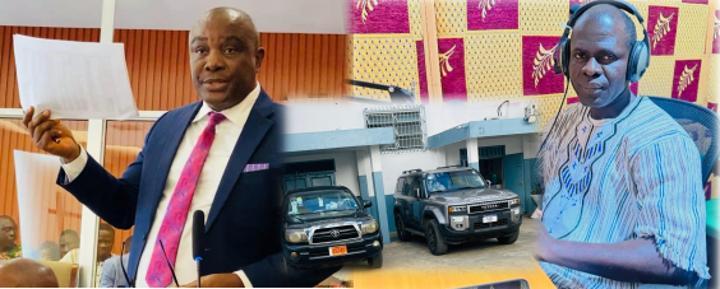Africa-Press – Liberia. The controversial purchase involved a Toyota Land Cruiser priced at US$78,000 and another vehicle reportedly bought for US$46,000 — both intended for use by top officials at the EPA.
The Environmental Protection Agency (EPA) has come under intense scrutiny following revelations that it breached the Government of Liberia’s (GoL) procurement policy on vehicle purchases by acquiring two high-end vehicles worth well above the officially approved spending cap.
The Senate Committee on Autonomous Commissions and Agencies revealed the violation during a regular session on Thursday, May 22.
The controversial purchase involved a Toyota Land Cruiser priced at US$78,000 and another vehicle reportedly bought for US$46,000 — both intended for use by top officials at the EPA.
These figures far exceed the US$45,000 threshold set by the Boakai administration in 2024 as part of an effort to curtail excessive public spending and instill fiscal discipline across all arms of government.
The policy, adopted by the Unity Party-led government, was designed to prohibit ministries, agencies, and state-run corporations from acquiring vehicles priced above the cap, with exceptions only granted to a select group of officials including the President, Vice President, Speaker and Deputy Speaker of the House, Chief Justice, and Associate Justices of the Supreme Court.
Despite the clear limitations, the EPA has emerged as the sole violator of the vehicle procurement ceiling, according to the report delivered by Senator Crayton Duncan, Chair of the Senate Committee on Autonomous Commissions and Agencies.
“He (Galakpa Kortimai) submitted information about 13 ministries and agencies and on that the only thing I see with a flag here is the US$45,000 plus US$100 for a Toyota Land Cruiser from the EPA. The next one is US$78,000 for the purchase of a Toyota Land Cruiser again for the EPA,” Senator Duncan told his colleagues during the plenary briefing.
Duncan, who represents Sinoe County in the 55th Legislature, said the report from the General Services Agency (GSA) covered only 13 ministries and agencies, and among those, only the EPA violated the procurement guideline. The remaining institutions were reported to have procured vehicles within or below the US$45,000 limit.
The information submitted by GSA Director General Galakpa Kortimai included a list of all government vehicle purchases from 2024 to the present. However, the limited number of institutions included in the submission raised concern among lawmakers who believe that the report does not reflect the full scope of government spending on vehicles.
When contacted, the EPA promised to respond today.
However, Senator Thomas Yaya Nimely of Grand Gedeh County described the GSA’s report as “selective” and questioned its credibility.
“We are not blind in this country. We walk around and see what’s happening starting from the Minister of State. There are vehicles here that were purchased for US$98,000 that are plying the streets. So why will he (Kortimai) go and send us a report that is so selective? He needs to come here and let’s find out how he got that report,” Nimely stated.
Senator Gbleh-bo Brown of Maryland County added his voice to the chorus demanding greater transparency, emphasizing that the GSA must account for spending across all government agencies and not just a select few.
“We know that the institutions and agencies of government are not 13 and he (Duncan) is doing a briefing for just 13. I think we should thank him but he should return and pursue the GSA to submit a comprehensive report for consideration by this Plenary,” Brown urged.
In response to the lawmakers’ concerns, the Senate Plenary has mandated the Committee on Autonomous Commissions and Agencies to pursue a comprehensive report covering vehicle purchases across all ministries and agencies for further legislative deliberation.
The issue of excessive spending on government vehicles has long been a source of frustration among Liberians, particularly those in economically marginalized communities. Many citizens see such expenditures as emblematic of wasteful governance that prioritizes the comfort of officials over the needs of the populace.
Citizens interviewed across Monrovia and other parts of the country have expressed strong disapproval of the recurring trend where elected and appointed officials use state resources to acquire luxurious vehicles while schools, hospitals, roads, and other critical infrastructure remain underfunded.
“This is a waste of taxpayers’ money,” said Samuel Kollie, a school teacher in Paynesville. “The government should be spending that kind of money on education, healthcare, or fixing roads—not buying expensive cars for officials who are already living better than most of us.”
Others have raised concerns about the abuse and misuse of government vehicles, especially during weekends and non-working hours. There are widespread complaints of government officials using official vehicles for personal errands, leisure trips, or to transport family members and friends—practices that the General Services Agency (GSA) has failed to adequately regulate or penalize over the years.
Furthermore, the GSA has historically struggled to retrieve government assets, including vehicles, from officials at the end of their tenure, especially during transitions of power. The lack of enforcement mechanisms and accountability has emboldened misuse and contributed to resource mismanagement across various sectors of government.
In the meantime, transparency advocates and civil society organizations are calling on the Legislature to exercise its oversight powers more rigorously to ensure that public resources are used responsibly and in accordance with the law.
For More News And Analysis About Liberia Follow Africa-Press






